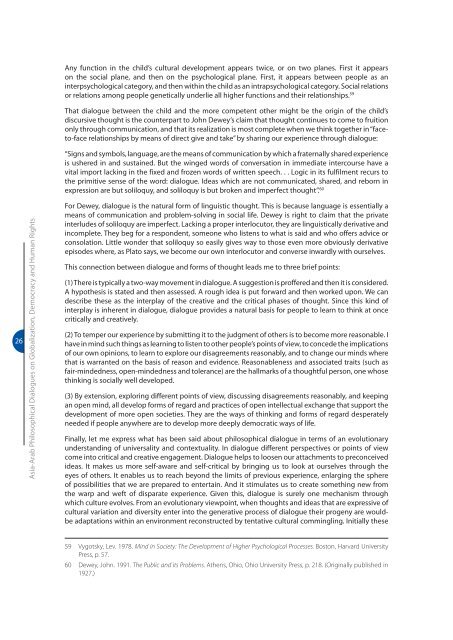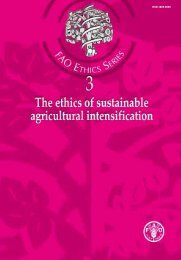Asian-Arab philosophical dialogues on globalization, democracy ...
Asian-Arab philosophical dialogues on globalization, democracy ...
Asian-Arab philosophical dialogues on globalization, democracy ...
Create successful ePaper yourself
Turn your PDF publications into a flip-book with our unique Google optimized e-Paper software.
26<br />
Asia-<str<strong>on</strong>g>Arab</str<strong>on</strong>g> Philosophical Dialogues <strong>on</strong> Globalizati<strong>on</strong>, Democracy and Human Rights<br />
Any functi<strong>on</strong> in the child’s cultural development appears twice, or <strong>on</strong> two planes. First it appears<br />
<strong>on</strong> the social plane, and then <strong>on</strong> the psychological plane. First, it appears between people as an<br />
interpsychological category, and then within the child as an intrapsychological category. Social relati<strong>on</strong>s<br />
or relati<strong>on</strong>s am<strong>on</strong>g people genetically underlie all higher functi<strong>on</strong>s and their relati<strong>on</strong>ships. 59<br />
That dialogue between the child and the more competent other might be the origin of the child’s<br />
discursive thought is the counterpart to John Dewey’s claim that thought c<strong>on</strong>tinues to come to fruiti<strong>on</strong><br />
<strong>on</strong>ly through communicati<strong>on</strong>, and that its realizati<strong>on</strong> is most complete when we think together in “faceto-face<br />
relati<strong>on</strong>ships by means of direct give and take” by sharing our experience through dialogue:<br />
“Signs and symbols, language, are the means of communicati<strong>on</strong> by which a fraternally shared experience<br />
is ushered in and sustained. But the winged words of c<strong>on</strong>versati<strong>on</strong> in immediate intercourse have a<br />
vital import lacking in the fixed and frozen words of written speech. . . Logic in its fulfilment recurs to<br />
the primitive sense of the word: dialogue. Ideas which are not communicated, shared, and reborn in<br />
expressi<strong>on</strong> are but soliloquy, and soliloquy is but broken and imperfect thought”. 60<br />
For Dewey, dialogue is the natural form of linguistic thought. This is because language is essentially a<br />
means of communicati<strong>on</strong> and problem-solving in social life. Dewey is right to claim that the private<br />
interludes of soliloquy are imperfect. Lacking a proper interlocutor, they are linguistically derivative and<br />
incomplete. They beg for a resp<strong>on</strong>dent, some<strong>on</strong>e who listens to what is said and who offers advice or<br />
c<strong>on</strong>solati<strong>on</strong>. Little w<strong>on</strong>der that soliloquy so easily gives way to those even more obviously derivative<br />
episodes where, as Plato says, we become our own interlocutor and c<strong>on</strong>verse inwardly with ourselves.<br />
This c<strong>on</strong>necti<strong>on</strong> between dialogue and forms of thought leads me to three brief points:<br />
(1) There is typically a two-way movement in dialogue. A suggesti<strong>on</strong> is proffered and then it is c<strong>on</strong>sidered.<br />
A hypothesis is stated and then assessed. A rough idea is put forward and then worked up<strong>on</strong>. We can<br />
describe these as the interplay of the creative and the critical phases of thought. Since this kind of<br />
interplay is inherent in dialogue, dialogue provides a natural basis for people to learn to think at <strong>on</strong>ce<br />
critically and creatively.<br />
(2) To temper our experience by submitting it to the judgment of others is to become more reas<strong>on</strong>able. I<br />
have in mind such things as learning to listen to other people’s points of view, to c<strong>on</strong>cede the implicati<strong>on</strong>s<br />
of our own opini<strong>on</strong>s, to learn to explore our disagreements reas<strong>on</strong>ably, and to change our minds where<br />
that is warranted <strong>on</strong> the basis of reas<strong>on</strong> and evidence. Reas<strong>on</strong>ableness and associated traits (such as<br />
fair-mindedness, open-mindedness and tolerance) are the hallmarks of a thoughtful pers<strong>on</strong>, <strong>on</strong>e whose<br />
thinking is socially well developed.<br />
(3) By extensi<strong>on</strong>, exploring different points of view, discussing disagreements reas<strong>on</strong>ably, and keeping<br />
an open mind, all develop forms of regard and practices of open intellectual exchange that support the<br />
development of more open societies. They are the ways of thinking and forms of regard desperately<br />
needed if people anywhere are to develop more deeply democratic ways of life.<br />
Finally, let me express what has been said about <str<strong>on</strong>g>philosophical</str<strong>on</strong>g> dialogue in terms of an evoluti<strong>on</strong>ary<br />
understanding of universality and c<strong>on</strong>textuality. In dialogue different perspectives or points of view<br />
come into critical and creative engagement. Dialogue helps to loosen our attachments to prec<strong>on</strong>ceived<br />
ideas. It makes us more self-aware and self-critical by bringing us to look at ourselves through the<br />
eyes of others. It enables us to reach bey<strong>on</strong>d the limits of previous experience, enlarging the sphere<br />
of possibilities that we are prepared to entertain. And it stimulates us to create something new from<br />
the warp and weft of disparate experience. Given this, dialogue is surely <strong>on</strong>e mechanism through<br />
which culture evolves. From an evoluti<strong>on</strong>ary viewpoint, when thoughts and ideas that are expressive of<br />
cultural variati<strong>on</strong> and diversity enter into the generative process of dialogue their progeny are wouldbe<br />
adaptati<strong>on</strong>s within an envir<strong>on</strong>ment rec<strong>on</strong>structed by tentative cultural commingling. Initially these<br />
59 Vygotsky, Lev. 1978. Mind in Society: The Development of Higher Psychological Processes. Bost<strong>on</strong>, Harvard University<br />
Press, p. 57.<br />
60 Dewey, John. 1991. The Public and its Problems. Athens, Ohio, Ohio University Press, p. 218. (Originally published in<br />
1927.)

















